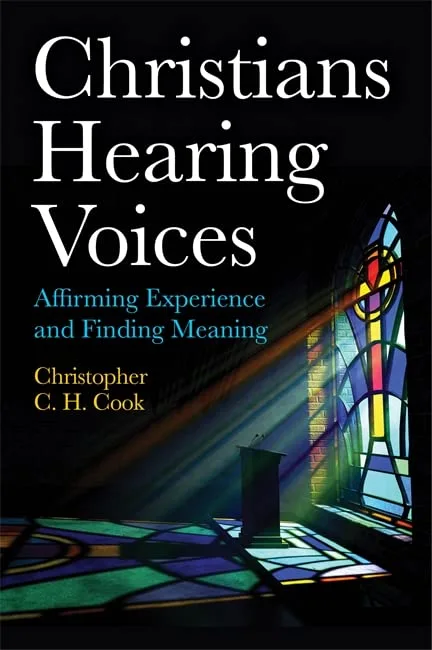The Phenomenon of Hearing Voices
Hearing “voices” without an obvious source is experienced more frequently than many believe. Termed “auditory verbal hallucinations” (AVH) within medical terminology), voice hearing occurs in all population groups. In Western cultures it is often feared, distrusted, and considered an indication that something is terribly amiss in the hearer. Even among people who believe in a spiritual realm, it is frequently seen as a sign of emotional stress, mental instability, or severe mental illness, although some faiths may also consider such phenomena to be attacks by a spiritual enemy.
Professional education in health disciplines, and even in theology and spirituality or pastoral care, mostly trains practitioners towards caution or disbelief regarding the “voices”. Often concern and distrust is warranted; for certain clinical diagnoses, medication can reduce or eliminate AVH. Recent research, however, demonstrates that AVH is also experienced by people who demonstrate no evidence of mental disorder[i]. Moreover, for these people, such “hallucinations” are often helpful, comforting, and inspirational.

The Bible attests to the reality and sanity of voice hearing. It frequently reports “AVH” as having been preceded or accompanied by visible phenomena witnessed by onlookers. The onlookers were mostly in supportive relationships with the recipients, though sometimes not. The accompanying phenomena included: fire (Exod 3:2–22; 1 King 19:12), shining faces (Exod 34:29; Matt 17:2), wild winds (1 King 19:11), earthquake (1 King 19:11), thunder (John 12:29), bright light (Acts 9:3), clouds (Matt 17:5), and the appearance of ancient saints (Matt 17:5).
Biblical authors attributed such voices to various speakers: God the Father (Exod 3:2–22; Luke 3:22, John 12:28), the risen Christ (Acts 9:4–6), the Holy Spirit (Luke 12:12), angels (Matt 1:20–21; 2:13; Luke 1:13–20, 28–37), the adversary (Gen 3:1–4; Luke 4:3–9), demons (Matt 8:29; Mark 5:12), and even a donkey (Num 22:30)! While some voices were presented as deceptive and destructive, Biblical authors presented most of these voices as important, even necessary, for diverse divine purposes including testimony, guidance, instruction, warning, preparation, comfort, and rebuke.
An Unmet Need
Christians with responsibility for caring for others, especially pastors and those with psychiatric and psychological training, therefore work in the often uncomfortable intersection of competing worldviews and professional paradigms. They need accurate information, sound principles, and careful discernment to manage the tensions inherent in this intersection and to engage respectfully with people who experience voice hearing.
The need for discernment is obvious but practical advice for discerning experiences and responding appropriately is limited.
The need for discernment is obvious but practical advice for discerning experiences and responding appropriately is limited for several reasons. These include widespread shaming and suspicion regarding voice hearing, limited platforms for testimonies about the impact of hearing voices—even amongst Christians—and minimal formal research into the phenomenon except in relation to the diagnosis and treatment of severe mental illness.
The Book Being Reviewed
Christians Hearing Voices begins to address these knowledge deficiencies. The book does not privilege medical interventions over spiritual practices, nor does it privilege pastoral approaches over medical care; rather, it recognises the particular and complementary strengths, successes, and failures (!) of both approaches. The author is a psychiatrist, an Anglican priest, a theologian at Durham University, and one of the co-investigators for the Hearing the Voice research project. He is very familiar with the tensions of intersecting paradigms and well equipped to write about them.
Christians Hearing Voices essentially has three foci. The first focus is a brief though wide ranging overview of how historic and contemporary religious traditions and health professionals perceive voice hearing or AVH. The second focus is personal reports of the experiences of Christians who hear voices and their reflections regarding the emotions and thoughts prompted by the voices. The third part is the author’s reflections on what these testimonies imply for Christian discernment and pastoral and healthcare practice.
The book does not provide prescriptive checklists for making quick decisions regarding the origins of the voices, though it does offer useful key principles in discernment.
The people who provided testimonies for the book were recruited through advertisements in Christian publications in the United Kingdom—thus the reported experiences could be criticised as being Euro-centric. Participants came from a range of religious traditions. Some participants have a diagnosed mental health condition, most do not. Almost all responders described the voices and experiences as ultimately helpful although one—who found their experiences distressing—declined to allow their account to be published. The book therefore does not explore the negative aspects of Christian voice hearing; perhaps that will come from subsequent studies.
The testimonies are reported verbatim. Most are short, factual, and easily read; others are longer and more emotionally revealing. Some report single experiences; others cover repeated phenomena. Some examples correspond easily with Biblical examples; others do not. Like many of the voices reported in Scripture, often the voices were heard at times of crisis or when the recipient needed guidance or reassurance. Readers of the book will likely agree that most testimonies can be classified as Christian but may question others. While some questions will remain for readers, others will be answered in the book’s final chapters.
The personal descriptions are occasionally surprising. One participant reported having lived with diagnosed schizophrenia for many years: over time, this participant came to Christ through discerning and often trusting those voices. The report reminds readers, especially those who fear mental illness, that it cannot stop someone entering the kingdom of God; mental illness, like all things in a flawed world, can be used by God for good.
Christians Hearing Voices is simply and clearly written. The author’s writing is gentle and thoughtful in tone; respectful of participants and their experiences, and quietly reflective of professionals’ roles in engaging with people who seem to be experiencing AVH. As such, it is an excellent introduction to voice hearing for pastors, health professionals, and ordinary Christians who have little understanding of what the experience of hearing voices can be for hearers.
The book does not provide prescriptive checklists for making quick decisions regarding the origins of the voices, though it does offer useful key principles for discernment. It provides sound and relational advice for Christians with pastoral or healthcare responsibilities when engaging with people who hear voices. The author also recommends closer partnerships between pastoral and healthcare professionals in understanding and assisting individuals who hear voices—while also acknowledging partnership working may not be easily achieved.
The book powerfully reminded me the distinguishing feature of a Christian’s life should be how well and deeply one loves God, fellow Christians, and needy and marginalised people around us. Any strategy for interacting with others we may not understand—and for discerning reality, confusion, deception, good, evil, etc.—can be unhelpful when not steeped in humility and agape love.
Further Reading
Christians Hearing Voices has an extensive reference list for those who would like to explore the existing research for themselves. Prof Cook has also written a more scientific and theological examination[ii] of voice hearing for those who would like a deeper understanding from the perspectives of relevant disciplines. (This is available as a free pdf download from Durham University[iii].)
Statement of Interest
Dr Sharyn Maxwell previously collaborated with Prof Cook in the provision of interdisciplinary postgraduate degrees at Durham University, UK. She is also an external member of the Centre for Spirituality, Theology and Health, Durham University, UK.
[i] Information on recent research findings regarding voice hearing is available in the CHV bibliography and the websites https://hearingthevoice.org and https://understandingvoices.com. The Hearing the Voice site describes a research project at Durham University and its outcomes. The Understanding Voices website provides a user-friendly overview of many aspects of AVH.
[ii] Cook, Christopher C.H, Hearing Voices, Demonic and Divine. Scientific and Theological Perspectives. 2019. Routledge.
[iii] Download available at https://dro.dur.ac.uk/27003/1/27003.pdf?DDD32+dth0ccc.






